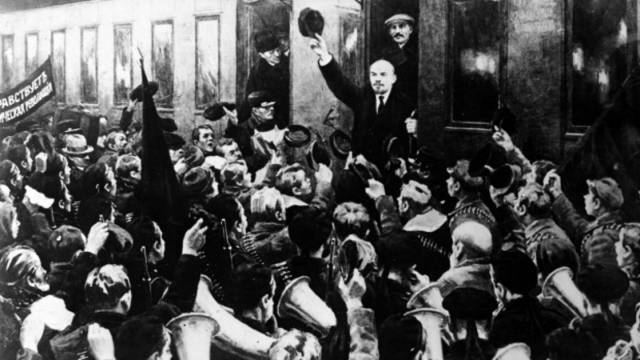April 16, 1917: Vladimir Lenin returns to Russia from exile
Vladimir Lenin was born in Streletskaya, Ulitsa, Simbirsk,
Russia in 1870. He was the son of middle-class Russian serfs. He was a very strong-willed,
obstinate child. In 1886, his father died, and young Vladimir began lashing out.
He enrolled at Kazan University to study law. While at university, his eldest
brother was convicted and executed for plotting to assassinate the Tsar. With
the combined deaths of his father and brother in such a short time, he grew
increasingly isolated and angry. He began to resent the repressive Tsarist regime.
In 1887, Lenin took part in several antigovernment protest.
He became interested in Marxist philosophies, devouring Karl Marx’s Capital and
Communist Manifesto. By 1893, he had graduated, and became a well-known lawyer
in St. Petersburg. He became involved with several prominent Marxist cells in
the city. He was an outspoken critic of the government, which forced him into
exile in 1900. During his exile, he traveled all over western Europe. In his absence,
the Marxist contingent in Russia formed into the Russian Social Democratic
Labor Party. By 1905, the party grew into the Bolshevik party. Throughout the
1910’s, Lenin worked to progress the ideas of the newly founded Bolshevik
movement. In 1914, his progress was halted with the outbreak of the First World
War.
By 1917, the countries of Europe had fought themselves to a
bloody stalemate. Germany was fighting a war on two fronts. The fighting on the
Eastern front had devastated the Russian economy. Munities and worker uprisings
sprung up throughout the empire. Ironically, the war helped propagate Lenin’s
Bolshevik ideas. The Germans hatched a plan. In February, the February
Revolution broke out and Lenin wanted to join the fray. Strangely enough, the
Germans allowed Lenin to leave and cross the border into Russia. It was only
found out after the war, that Lenin was allowed to go because the Germans wanted
to undermine the Russian government, and end the war in the East. He arrived in
Russia on April 16 to a cheering crowd. The next couple of years would see the
collapse of the Tsarist regime and the ascension of Lenin and the Bolsheviks to
power.




Comments
Post a Comment